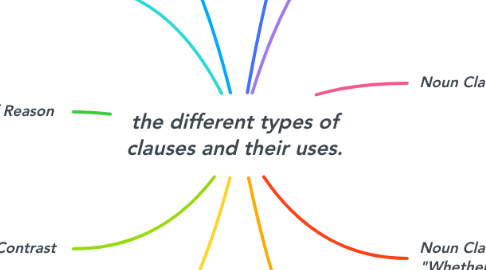the different types of clauses and their uses.
von Jackeline Pedrol


1. Adverbial Clauses
1.1. These clauses function as adverbs, modifying the verb and explaining when, why, how, or under what conditions something happens.
2. Adverbial Clauses of Time
2.1. Answer the question "when?"
2.2. I will call you when I get home.
2.2.1. "When I get home" tells us when the action will happen.
3. Adverbial Clauses of Reason
3.1. Explain why something happens.
3.2. I didn’t go to school because I had a headache.
3.2.1. "Because I had a headache" is the reason I didn’t go.
4. Adverbial Clauses of Contrast
4.1. Show an idea that contrasts with what is expected.
4.2. Although I was tired, I finished my homework.
4.2.1. "Although I was tired" contrasts with "I finished my homework".
5. Adverbial Clauses of Condition
5.1. Explain under what condition something happens.
5.2. If you study, you will do well on the test.
5.2.1. "If you study" shows the condition for "you will do well on the test"
6. A clause is a combination of words that make up a sentence. which consists of a subject and a predicate.
7. Noun Clauses with "That"
7.1. Used to express thoughts, beliefs, statements, or desires.
7.2. My mom always says that patience is the key to success.
7.2.1. Here, that patience is the key to success is what my mom says, meaning it's the direct object.
8. Noun Clauses as Indirect Questions
8.1. Used when we mention a question without asking it directly.
8.2. I don’t know where I left my keys.
8.2.1. " Where I left my keys" is the object of "I don’t know". It’s like a question in your mind, but without question marks.
9. Noun Clauses with "If" or "Whether"
9.1. Used to talk about doubts or situations where we are unsure about something.
9.2. I’m not sure if I’m going to the party.
9.2.1. "If I’m going to the party" expresses the doubt I have.
10. Noun Clauses in the Subjunctive Mood
10.1. Used after expressions like "it’s important that," "it’s necessary that," or "I recommend that."
10.2. It is important that everyone arrive on time.
10.2.1. "That everyone arrive on time" is what’s important. Notice that "arrive" is in the subjunctive because it expresses a more formal idea.
